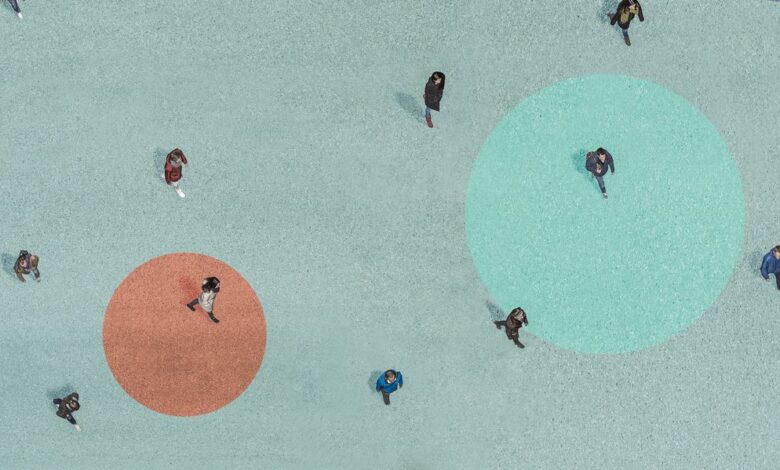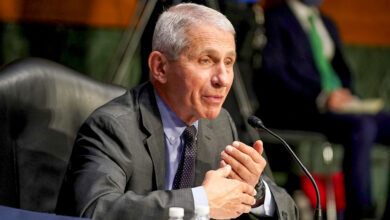Can You Get COVID-19 Twice? Experts Explain How New Coronavirus Strains Affect Immunity

- Getting COVID-19 twice is possible, but reinfection is extremely rare, according to officials at the Centers for Disease Control and Prevention.
- Scientists are still researching how long natural immunity lasts on average, and how COVID-19 antibodies may prevent further infection; one study estimates a range of 8 months of boosted immunity.
- New coronavirus variants could pose a threat to those who have recovered from COVID-19 earlier in 2020, experts say.
For health experts, there is still so much left to learn about the novel coronavirus — but if one thing is certain, it’s that COVID-19 infections are evolving this winter due to brand new strains that experts haven’t seen before. With more than 24 million COVID-19 cases reported in the United States over the last 11 months, some are wondering if these new variants could cause reinfection, even if they pushed past the disease the first time around. As is standard with most of our questions about COVID-19, there isn’t a simple answer — but the short one is that variants, old and new, can indeed make you sick once more. Getting COVID-19 twice is possible, but it is more complicated (and rare!) than you may think.
Scientists are rapidly identifying new variants that are spreading across the world. One of the earliest COVID-19 variations was identified in the United Kingdom, but isn’t as troublesome to experts as other strains, primarily a variant known as B.1.351, with origins having been largely traced back to South Africa. There are three other variants that have been flagged for being able to spread too rapidly, according to officials at the Centers for Disease Control and Prevention (CDC), and scientists are worried these strains may mutate further to impact vaccination efforts, CNN reports. But the variant first traced to South Africa has already shown signs that it may push past any immunity granted to people, either because they’ve already been sick or have received a vaccine.
“These variants are getting smarter; they’re just adapting to be able to grow better in humans… even without having to adapt to the vaccine,” says Nelson Michael, M.D., the director of Walter Reed Army Institute of Research‘s Center for Infectious Disease Research. “The thing that worries me about this variant [discovered in South Africa] is that as it became better at replicating, it also happened to develop the kinds of characteristics that make it less susceptible to monoclonal antibodies that we developed, some therapies, and tools, like vaccines, to prevent infection.”
But Dr. Michael says most health experts are confident that vaccinations will work to stem the spread of all COVID-19 variants. Early data suggests a full vaccination provides enough antibodies to fight off a range of variants, as reported by the Guardian, but more importantly, Dr. Michael explains that vaccine manufacturers are already actively tweaking their vaccines for the near future to better respond to particular variants.
Is it possible to get reinfected with COVID-19?
Yes, but the likelihood of this happening is rare. Current CDC language states that “reinfection with COVID-19 have been reported, but remain rare” overall. Reinfection means you’ve successfully overcome COVID-19 at some point, fully recovered and have tested negative for an active SARS-CoV-2 infection, before then contracting the virus again at a later date (even if you don’t show symptoms). Many experts, including those at the CDC, maintain that confirmed reinfections are very rare — but the issue here may be that care providers have trouble determining when the first infection is over and when a second one begins.
“For almost every doctor who cares for COVID patients, there have been questions raised about whether some of their patients may indeed have had second infections,” explains William Schaffner, M.D., the medical director for the National Foundation for Infectious Diseases, adding that most data suggests natural immunity lasts for at least 6 months. “But on occasion, there are people who, even within six months, think they may have been infected twice — they may have, but we just don’t have enough scientific information to confirm that a second infection did occur.”
What’s clear, however, is that anyone who has immunity — whether because they’ve recovered from COVID-19 directly or have received a vaccine — must continue to practice preventative measures to avoid getting sick twice. Both doctors agree: Immunity and its antibodies produced by an infection doesn’t make you invincible, but can aid your body in fighting off smaller, targeted amounts of SARS-CoV-2 should you come across it once more.
How long does COVID-19 immunity last? Will it protect me from new strains?
Like many other aspects of this disease, scientists are still researching to determine a firm timeframe of how long antibodies are active in those who were infected with SARS-CoV-2. One particular study may provide some insight into a future definitive answer, despite the fact that it has yet to be published in a peer-reviewed journal. Researchers reviewed antibody counts in over 180 confirmed COVID-19 cases, tracking them over time. The findings suggest that antibodies and other immunity signifiers were noted as far as eight months out from first infection, but did discover some variation in the number of antibodies produced between individuals. It’s unclear why some individuals were noted to have higher antibody counts compared to others.
This content is imported from Instagram. You may be able to find the same content in another format, or you may be able to find more information, at their web site.
With so much talk about the new COVID-19 variants, you may be wondering if a mutated version of SARS-CoV-2 may render any earned immunity ineffective? While it hasn’t been largely documented, Dr. Michael says it is possible, and that your second case of COVID-19 may be largely different than the first.
“Being infected with a new strain might be something you don’t notice at first because you have enough immunity to essentially fight off almost all the side effects that come from that second infection,” he explains, adding that these infections may go entirely undiagnosed. “Not to say, well, that’s great — because you may pass it along to someone who’s very susceptible to any strain.”
The best way to avoid a second infection is to continue to be vigilant about practicing social distancing, hand hygiene, and wearing masks any time you are in public — and, when the time comes, to receive a vaccine. Likely, you’ll continue to receive new vaccines as new variants develop in the future, Dr. Schaffner explains.
“Current vaccines seem to be able to prevent severe disease, even in the circumstance that you’re dealing with a known variant. So there’s going to be at the least, partial protection,” he adds, using the annual flu shot as an example. “We have to reconfigure that vaccine on an annual basis, and even if you get influenza after taking the vaccine, it’s almost invariably a milder case, one that’s less severe.”
This content is created and maintained by a third party, and imported onto this page to help users provide their email addresses. You may be able to find more information about this and similar content at piano.io
Source link




